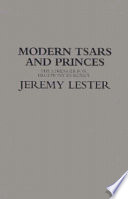
Modern Tsars and Princes
By - Lester, Jeremy
Floor
-
Floor 1
Published
-
Verso, London, 1995
ISBN 10 - 1859849148
ISBN 13 - 9781859849149
Book Status
-
1 Qnty Available with us.
Subject
-
Power (Social sciences)
Shelf No
-
15
Call Number
-
320.9470 LES
Physical Description
-
xiii, 320 pages : illustrations ; 24 cm
Notes
-
Include index